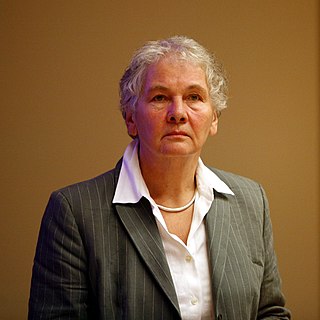A Quote by Leigh Hunt
There is scarcely a single joy or sorrow within the experience of our fellow-creatures which we have not tasted; yet the belief, in the good and beautiful has never forsaken us. It has been medicine to us in sickness, richness in poverty, and the best part of all that ever delighted us in health and success.
Related Quotes
Sorrow is so woven through us, so much a part of our souls, or at least any understanding of our souls that we are able to attain, that every experience is dyed with its color. This is why, even in moments of joy, part of that joy is the seams of ore that are our sorrow. They burn darkly and beautifully in the midst of joy, and they make joy the complete experience that it is. But they still burn.
[All the ancient wisdom] tells us that work is necessary to us, as much a part of our condition as mortality; that good work is our salvation and our joy; that shoddy or dishonest or self-serving work is our curse and our doom. We have tried to escape the sweat and sorrow promised in Genesis - only to find that, in order to do so, we must forswear love and excellence, health and joy. (pg. 44, "The Unsettling of America")
It is the consciousness of the threefold joy of the Lord, His joy in ransoming us, His joy in dwelling within us as our Saviour and Power for fruitbearing and His joy in possessing us, as His Bride and His delight; it is the consciousness of this joy which is our real strength. Our joy in Him may be a fluctuating thing: His joy in us knows no change.
God might grant us riches, honours, life, and even health, to our own hurt; for every thing that is pleasing to us is not always good for us. If he sends us death, or an increase of sickness, instead of a cure, Vvrga tua et baculus, tuus ipsa me consolata sunt. "Thy rod and thy staff have comforted me," he does it by the rule of his providence, which better and more certainly discerns what is proper for us than we can do; and we ought to take it in good part, as coming from a wise and most friendly hand.
We can scarcely indeed look into any part of the sacred volume without meeting abundant proofs, that it is the religion of the Affections which God particularly requires. Love, Zeal, Gratitude, Joy, Hope, Trust, are each of them specified; and are not allowed to us as weaknesses, but enjoined on us as our bounden duty, and commended to us as our acceptable worship.
We study health, and we deliberate upon our meats and drink and air and exercises, and we hew and we polish every stone that goes to that building; and so our health is a long and regular work. But in a minute a cannon batters all, overthrows all, demolishes all; a sickness unprevented for all our diligence, unsuspected for all our curiosity, nay, undeserved, if we consider only disorder, summons us, seizes us, possesses us, destroys us in an instant.
The three of us have worked on the development of the small and totally harmless fruit fly, Drosophila. This animal has been extremely cooperative in our hands - and has revealed to us some of its innermost secrets and tricks for developing from a single celled egg to a complex living being of great beauty and harmony. ... None of us expected that our work would be so successful or that our findings would ever have relevance to medicine.
All of us--all who knew her--felt so wholesome after we cleaned ourselves on her. We were so beautiful when we stood astride her ugliness. Her simplicity decorated us, her guilt sanctified us, her pain made us glow with health, her awkwardness made us think we had a sense of humor. Her inarticulateness made us believe we were eloquent. Her poverty kept us generous. Even her waking dreams we used--to silence our own nightmares.
We are on the earth, and they tell us of heaven; we are human beings, and they tell us of angels and devils; we are matter, and they tell us of spirit; we have five senses whereby to admit truths, and a reasoning faculty by which to build our belief upon them; and they tell us of dreams dreamed thousands of years ago, which our experience flatly contradicts.
The storyteller is deep inside everyone of us. The story-maker is always with us. Let us suppose our world is attacked by war, by the horrors that we all of us easily imagine. Let us suppose floods wash through our cities, the seas rise . . . but the storyteller will be there, for it is our imaginations which shape us, keep us, create us - for good and for ill. It is our stories that will recreate us, when we are torn, hurt, even destroyed. It is the storyteller, the dream-maker, the myth-maker, that is our phoenix, that represents us at our best, and at our most creative.
Although our moral conscience is a part of our consciousness, we do not feel ourselves on an equality with it. In this voice which makes itself heard only to give us orders and establish prohibitions, we cannot recognize our own voices; the very tone in which it speaks to us warns us that it expresses something within us that is not of ourselves.
In order to do something you've never done,
you've got to become someone you've never been. I
think that all of us have great potential within us,
but greatness is a choice; it's not our destiny. And in
the pursuit of our dreams we are introduced to trials,
failures and disappointments , which take us to the
door of discovery and greatness.







































